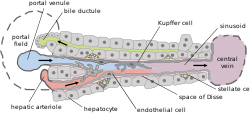Canals of Hering
| Canals of Hering | |
|---|---|
 The canal of Hering, not labeled, leads to the bile ductule | |
| Details | |
| Identifiers | |
| Latin | ductulus bilifer |
| FMA | 17545 |
| Anatomical terminology | |
The canals of Hering, or intrahepatic bile ductules, are part of the outflow system of exocrine bile product from the liver. Liver stem cells are hypothesized to inhabit the canals.[1][2]
Structure
[edit]They are found between the bile canaliculi and interlobular bile ducts near the outer edge of a classic liver lobule.[3][4]
Histology
[edit]Histologically, the cells of the ductule are described as simple cuboidal epithelium, lined partially by cholangiocytes and hepatocytes. They may not be readily visible but can be differentially stained by cytokeratins CK19 and CK7.
Clinical relevance
[edit]The canals of Hering are destroyed early in primary biliary cholangitis and may be primary sites of scarring in methotrexate toxicity. Research has indicated the presence of intraorgan stem cells of the liver that can proliferate in disease states, so-called oval cells.[5] Liver stem cells are theorized to originate in the niches of the canals.[6][1]
History
[edit]They are named for Ewald Hering.[7]
References
[edit]- ^ a b Oliva, Joan; French, Barbara A.; Qing, X.; French, Samuel W. (2010). "The identification of stem cells in human liver diseases and hepatocellular carcinoma". Experimental and Molecular Pathology. 88 (3). Elsevier BV: 331–340. doi:10.1016/j.yexmp.2010.01.003. ISSN 0014-4800. PMC 3593713.
- ^ De Alwis, Nimantha; Hudson, Gavin; Burt, Alastair D.; Day, Christopher P.; Chinnery, Patrick F. (2009-07-07). "Human liver stem cells originate from the canals of hering". Hepatology. 50 (3). Ovid Technologies (Wolters Kluwer Health): 992–993. doi:10.1002/hep.23160. ISSN 0270-9139.
- ^ Ross, M.H. & Pawlina, W. 2003. Histology: A Text and Atlas, 4th Edition. Lippincott Williams & Wilkins, Philadelphia.
- ^ Gartner, L.P. & Hiatt, J.L. 2000. Color Atlas of Histology, 3rd Edition. Lippincott Williams & Wilkins, Philadelphia.
- ^ Saxena, R. & Theise, N. 2004. Canals of Hering: Recent Insights and Current Knowledge, Semin Liver Dis 24: 43-48.
- ^ Kordes, Claus; Häussinger, Dieter (2013-05-01). "Hepatic stem cell niches". Journal of Clinical Investigation. 123 (5). American Society for Clinical Investigation: 1874–1880. doi:10.1172/jci66027. ISSN 0021-9738. PMC 3638908.
- ^ Hering E. Uber den Bau der Wirbelthierleber. Archiv für mikroskopische Anatomie 1867;3:88–118
